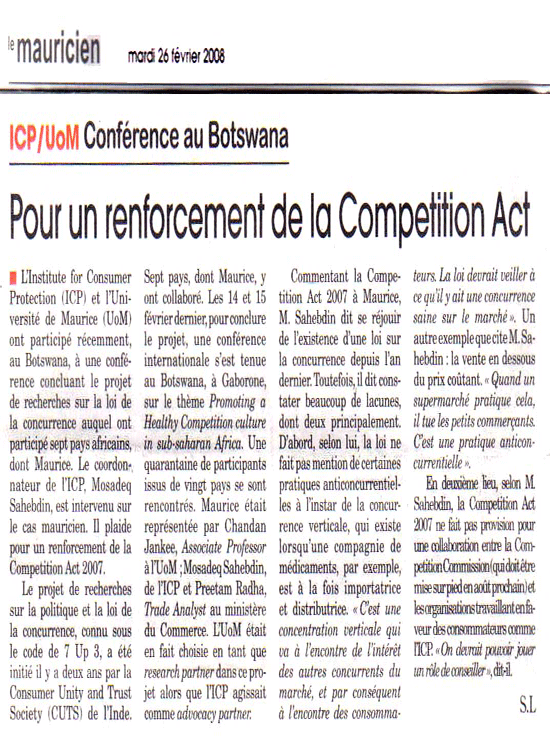Home
7Up3 Project
Agenda
List of Participants
Proceedings
Presentations & Papers
In Media
Press Releases
News Items
February 28, 2008
JOHN CHURU
The deputy minister was speaking recently at a two-day conference at Gaborone Sun Hotel, on competition policy which drew participants from as far afield as India, Nigeria, the Gambia, Malawi, Mauritius, Kenya, Namibia and Ethiopia.
Competition policy, once in place, is intended to monitor and eliminate unfair trade practices, protect the consumer and ensure sustained economic growth.
“In realising the importance of competitive markets in enhancing economic growth and poverty reduction, countries find it necessary to develop competition laws as a means to eliminate any business conduct that has the likely effect of limiting competition in the market,” said the assistant minister. He cited such undesirable conduct in business as abuse of dominance, collusive tendering, and price fixing among other forms of restrictive practices. He added that the Botswana government “is working towards enacting a competition law”. In 2005 the government of Botswana approved a competition policy, which stipulated the need to formulate a competition law and establish a competition authority, which was to follow immediately after finalising the law.
A research fellow with Botswana Institute for Development Policy Analysis (BIDPA), Monnare Monnare said the objectives of the competition policy and law for Botswana were chiefly to “enhance economic efficiency, promote consumer welfare, support economic growth and diversification”. He added that the competition policy and law also prevent and redress unfair practices adopted by firms against consumers and small firms, thereby complimenting other government policies and laws. Roger Nellist from Britain’s Department for International Development (DFID) added that fair and effective competition creates a level playing field for domestic SMMEs.
It also allows free entry and exit for firms as well as inculcating an environment for innovation, technology and productivity. Nellist revealed that a study of media reports in sub-Saharan Africa identified allegations of 617 anti-competition practices between 1995 and 2004 in 41 business sectors and 34 countries.
“The food and beverages sector registered the most complaints; 148. High prices in this sector have a direct impact on the welfare of the poor, who spend a high proportion of their income on necessities like food,” reported Nellist.
Mokalake said civil society, especially consumer organisations, should be closely involved in advocacy efforts of building a competition culture. “Active consumer organisations can make a significant difference to the effectiveness of competition law,” he said, adding that it is a matter of concern that consumer organisations are not yet well developed in many SADC countries, including Botswana. (Sila Press Agency)
This news item can also be accessed at:

February 20, 2008
Tumelo Setshogo
The Assistant Minister of Trade and Industry Lebonaamang Mokalake has challenged civil society, especially consumer organisations, to get involved in building a competitive culture.
Mokalake said this recently when officially opening a two-day International Conference on Competitive Policy and Law: Promoting a Healthy Competitive Culture in Sub-Saharan Africa at the Gaborone Sun.
The conference was attended by more than twenty representatives of CUTS – the Consumer Unity and Trust Society – from Botswana, Ethiopia, Malawi, Mauritius, Mozambique, Namibia, Kenya, Uganda, The Gambia and Nigeria.
“Active consumer organisations can make a significant difference to the effectiveness of Competition Law,” Mokalake said, adding that empowered consumers and representative organisations should bring anti-competitive practices to the attention of their competition authorities.
It was disturbing that consumer organisation were not well developed in many southern African countries, including Botswana, while the business sector was often better organised and financed and “contributes to policy decisions that affect their interests”.
Mokalake pointed out that a healthy competitive culture was the hallmark of a good competitive regime, which would complement government in establishing appropriate competition and “the efforts of the Botswana Government, which is currently formulating its Competition Law”. He reminded the participants that the globalisation of the world economy, coupled with market reforms, had not only opened up opportunities “but brought along new challenges in terms of regulation of economic activities”.
Mokalake said due to the role of competitive markets in economic growth and poverty reduction, countries found it necessary to develop competition laws as a means to “eliminate any business in the market”. He said in 2005, Government of Botswana approved a Competition Policy, which stipulated the need to formulate a competition law and establish a competition authority.
The minister urged the Botswana Council of Non-Governmental Organisations (BOCONGO) and other civil society organisations to act as a countervailing force to the business sector for the successful implementation of the competition policy and enactment of the law in Botswana.
Meanwhile, the India-based Secretary General of CUTS International, Pradeep Mehta, said the society’s engagement with the process of developing the competition regime in India was an example of how and why civil society should get involved in devising competition policy and laws.
The conference was organised in conjunction with the UK’s Department for International Development (DFID), BOCONGO, the Ministry of Trade and Industry and Norad.
This news item can also be accessed at:
http://allafrica.com/stories/200802200893.html
